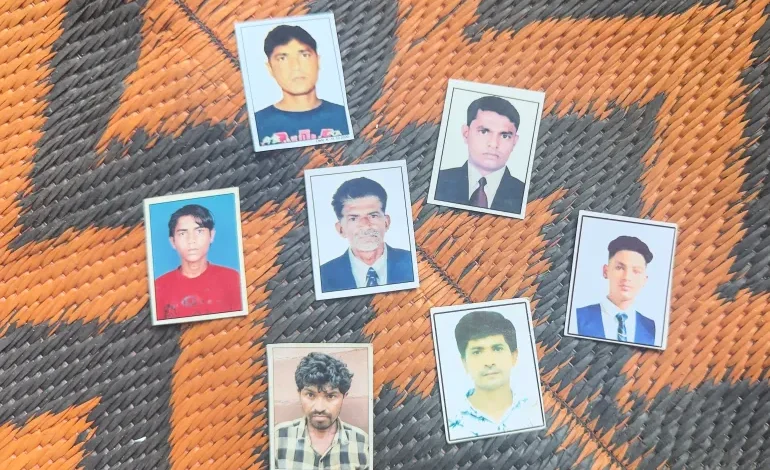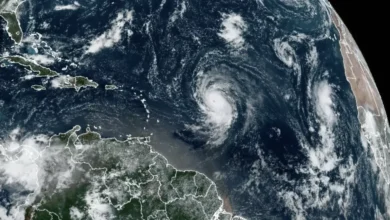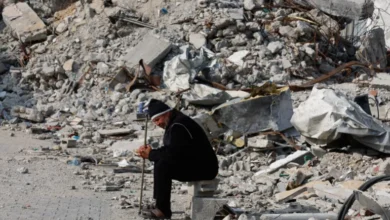Jailed for fishing: India-Pakistan tensions trap families in debt, poverty

Boxes of sweets are being passed around as cheers and joy surround Rajeshwari Rama’s brick house, insulated with tin sheets, in the Vanakbara village of Diu, a federally-controlled island along the India-Pakistan coastline near Gujarat state in western India.
Rama’s relatives and friends are talking at the top of their voices as they celebrate the release of her husband, fisherman Mahesh Rama, from the Landhi jail in neighbouring Pakistan’s largest city of Karachi, in February this year.Among the attendees is Laxmiben Solanki, 36, standing quietly in one corner. She does not taste the sweets. She is only marking her presence there, but remains preoccupied with thoughts of her husband, Premji Solanki.
Premji, 40, has also been in Pakistan’s Landhi jail since December 2022, along with several other Indian fishermen. Their crime: crossing a disputed border in the Arabian Sea, which divides the South Asian nuclear powers and sworn enemies, for fishing.In February, Pakistan released 22 Indian fishermen who had been imprisoned by Pakistan’s Maritime Security Agency between April 2021 and December 2022, while they were fishing off the coast of Gujarat – also the home state of Indian Prime Minister Narendra Modi. Three of those released are from Diu, 18 from Gujarat, and the remaining one person from the northern Indian state of Uttar Pradesh.Though India and Pakistan share a heavily militarised land border, their International Maritime Boundary Line in the Arabian Sea is also largely disputed, especially in a zone called Sir Creek, a 96km (60-mile) tidal estuary that separates India’s Gujarat and Pakistan’s Sindh provinces.
It is in this patch that fishermen from both India and Pakistan wander into deeper waters, often without realising they have entered foreign territory. Due to the terrain of the disputed territory, there is no border fencing, with a marshland acting as a natural boundary between the two nations.
Several years and rounds of diplomatic talks between India and Pakistan have not been able to resolve the dispute, which has even seen military tensions between them. In 1999, India shot down a Pakistani aircraft carrying 16 naval officers over the alleged violation of Indian airspace near their maritime border. The incident occurred just a month after the two countries fought a war in Kargil, a snowy district in Indian-administered Kashmir.
On March 17, India’s Ministry of External Affairs revealed that out of 194 Indian fishermen currently imprisoned in Pakistan, 123 are from Gujarat. According to the Indian government, it has 81 Pakistani fishermen in its custody. Families on both sides say their loved ones have been jailed for a crime they committed “unknowingly” – because they did not know they had ventured inside waters claimed by another country.
Trapped in debt
Pakistan released Mauji Nathubhai Bamaniya, 55, in February because his osteoporosis had gotten worse. “I still can’t believe that I am sitting in my house, in my country, with my family. My decaying bones brought me back to my homeland,” Bamaniya tells Al Jazeera in Vanakbar village.But it is the families of those still imprisoned in Pakistan that find themselves caught in a cycle of recurring debt and debilitating anxiety.
In another house, hidden amid palm trees in Vanakbara, Kantaben Chunilal, 60, looks with tired eyes at the dusty path leading to her home. She has been waiting for her son, Jashvant, since December 2022.
Jashvant was barely 17 when he was arrested by Pakistani forces. He was the family’s sole breadwinner.
Kantaben says she feels too ashamed to ask her relatives for more loans to fill the empty grain jars in her kitchen. She has borrowed nearly 500,000 rupees ($5,855) from several relatives for sustenance. “The government offers us a financial aid of $3 per day. It is not even half of what our men would earn,” she tells Al Jazeera.
Out of desperation, Kantaben says she sometimes randomly visits relatives during mealtimes, hoping they will accommodate her as a guest and she may save some money that day.
In the same village, Aratiben Chavda married fisherman Alpesh Chavda in 2020. Less than a year later, Alpesh was arrested by Pakistani forces while he was out fishing in the Sir Creek area.
Aratiben tells Al Jazeera their 3-year-old son Kriansh, born about four months after Alpesh’s arrest, has never seen his father. “We make him see his father’s photos, so that one day, when Alpesh comes back, my child can recognise him,” she says, sobbing.










